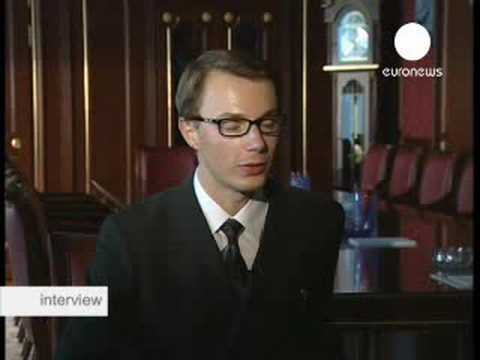Russia’s deputy prime minister has defended his country’s military actions in Georgia. Interviewed by EuroNews in Moscow, Sergei Ivanov expressed surprise at the international condemnation that followed and said Moscow had no choice but to respond to Georgia’s attempt to regain control of the breakaway region of South Ossetia.
Denis Loctier, Euronews: Mr Deputy Prime Minister, what’s your view of what has happened in the past few days?
Sergei Ivanov: “It was an attempt to destroy the Ossetian people, to push them out of the territory of South Ossetia. That – as Mr Saakashvili and probably some of his Western sponsors believed – would solve the problem with the separatist region. And according to the documentary proof we’re now seeing, they planned, after that, to conduct the same operation in Abkhazia. That’s what has happened. Genocide is what has happened, widespread physical destruction with artillery shells, tanks and guns, of thousands of Russian citizens. Basically, an ethnic cleansing operation was carried out.”
EuroNews: If Russia had evidence of genocide in South Ossetia – why didn’t it present that evidence to the UN Security Council and get UN backing for the use of force?”
Sergei Ivanov: “For several days the Russian Federation was conducting a military operation of peace enforcement. That operation is now concluded successfully. By that I mean that Georgia is now no longer capable of repeating its military offensive in South Ossetia or Abkhasia. And only now, when the operation has been completed and its goals achieved, can Russian criminal investigators and other law-enforcement officials work in the field to collect evidence which will then be presented to the international community along with corresponding accusations against the Georgian leadership.”
EuroNews: “The situation in South Ossetia has been building for a long time. Was the Russian military operation prepared in advance, or was this operation started only after the reports came in of Russian civilians and Russian peacekeepers being killed?”
Sergei Ivanov: “Let’s be rational. If the Russian Federation had known in advance, as you say, that Saakashvili had such insane plans – then, of course, we would have acted accordingly and would at least have put our military forces directly along the border between Russia and South Ossetia and by the Rockskiy tunnel (between North and South Ossetia). In that case, we could have responded within a couple of hours. But, naturally, that didn’t happen, because we couldn’t know about Saakashvili’s plans. Of course, we needed some time – about a day – to send our troops to South Ossetia to protect our citizens and peacekeepers. And in that time, Georgian troops shelled a city without being challenged, they fired on it with tanks and artillery, they crushed children under tank tracks, they burned women who were locked in sheds – all in all, they conducted genocide and ethnic cleansing.”
EuroNews: “Georgia claims it was defending itself, and says its troops didn’t target civilians in Tshinvali.”
Sergei Ivanov: “Defending itself from what? From the Ossetian people? At the moment when Georgia unleashed its military action in the conflict zone, there were about three hundred and fifty Russian peacekeepers, armed only with machine guns, since no other weapons were allowed according to the (ceasefire) agreement (then in place between Russia and Georgia for South Ossetia). There were no ‘Grads’ (multiple rocket launchers) and no tanks there. It was peacekeepers and local civilians. And a very small force, dwarfed by the Georgian army, the military forces of South Ossetia. The number of soldiers was completely mismatched. So who was it Georgia was defending itself against? It wasn’t defending, it was attacking. And only after we sent our additional troops to reinforce the peacekeeping contingent and to start a peace-enforcing operation – only then did Saakashvili cry out hysterically that Russia was attacking him.”
EuroNews: “What was the point of your strikes against targets outside the conflict zone – targets in Georgian territory, including civilian targets, according to eyewitnesses?”
Sergei Ivanov: “Eye witnesses? I think it’s more something that President Saakashvili’s has said. I wouldn’t trust such eyewitnesses too much, as many of them resemble too much Goebbels’ propaganda, trying to present white as black and vice versa, trying to present a victim of an aggression as the initiator of the aggression, and vice versa. Our ground forces never crossed the border of the conflict zone – instead they launched strikes in response to the Georgian forces attacks, such as artillery, which were still targeting Tskhinvali. There was speculation, panicky rumours and disinformation – that Russian tanks had allegedly entered Gori; stories of Russian planes bombing Tbilisi. They were all Goebbels style lies invented by the Georgian leadership.”
EuroNews: “Why do you think not a single country, except Cuba, supported the Russian military action?”
Sergei Ivanov: “In short, it’s maybe simply because of double standards. You see, Russia didn’t really have a choice after what the Georgian leadership did. Large numbers of our citizens were wiped out, and no one can disprove that, it’s a fact.”
EuroNews: “In conclusion – how solid do you think the ceasefire is that is now been established between Russia and Georgia?”
Sergei Ivanov: “I hope it will hold. I hope this time the Georgian leadership will have enough sense not to repeat the adventures it has pursued lately. I hope very much that the ceasefire will hold firm, but I’ll repeat: to ensure the ceasefire lasts we will take all necessary action for the security of our Russian citizens living in South Ossetia and Abkhazia.”
EuroNews: “What action precisely? Will the Russian army stay in those internationally unrecognised republics?”
Sergei Ivanov: “Not the Russian army, but peacekeeping forces, deployed there legitimately. You have to agree there’s a big difference, and the difference is fundamental.”
EuroNews: “Georgia says they are ‘occupying’ forces.”
Sergei Ivanov: “Well, Georgia can call them whatever it wants, it won’t change the reality.”





